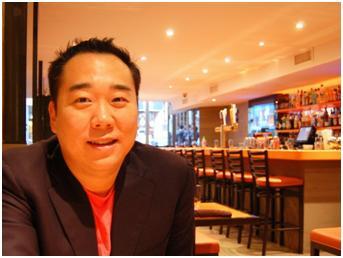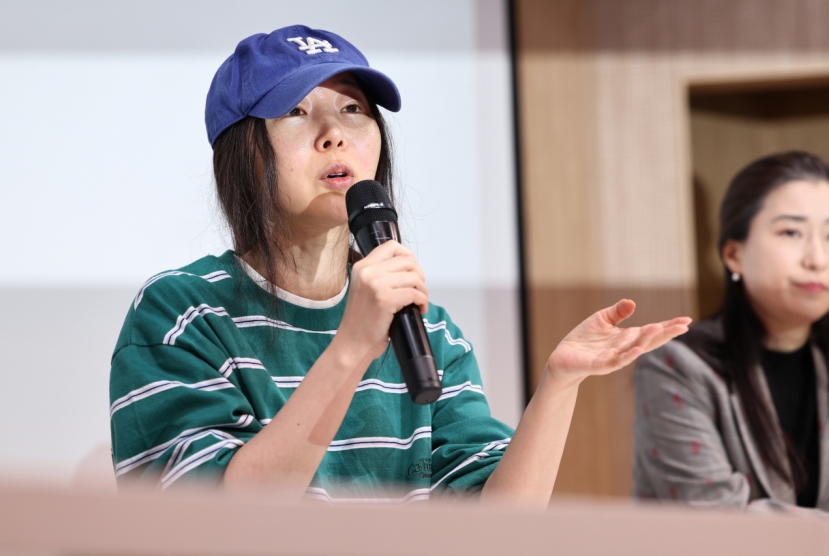Korean-American entrepreneur discovers possibilities for Korean cuisine in N.Y.
By Korea HeraldPublished : Dec. 14, 2011 - 20:20
NEW YORK (Yonhap News) ― When popular online dining and drinking site Eater.com announced its search for the “Greatest Burger in America” in April, few expected the winning burger would be infused with a traditional Korean dish. The “bibimbap burger,” created by Korean-American entrepreneur Bobby Kwak, is a hamburger topped with ingredients from the popular Korean dish “bibimbap,” vegetables and meat mixed with steamed rice and hot pepper sauce.
The bibimbap burger was quietly nominated as a contender for the best burger in New York City, a surprise even to the owners of Social Eatz that served it. It won the honor soon after, and went on to win the title of “the Greatest Burger in America” via online voting, surpassing the best burgers from eight other cities.
Social Eatz, a casual restaurant where the bibimbap burger originated, became packed with New Yorkers and tourists alike who wanted to try the latest best burger in town. Its executive chef Angelo Sosa found renewed fame following his appearance in the reality culinary competition show Top Chef in 2010.
This bibimbap burger story began in January with Bobby Kwak. As Kwak was getting ready to open a new casual restaurant in midtown Manhattan with the concept of offering “American comfort food with an Asian kick,” he approached Angelo Sosa, a skilled chef mentored by Jean-Georges Vongerichten, with an expertise in Southeast Asian flavors and popularity to match from his days as a Top Chef contestant.
The young minds of Kwak and Sosa, both in their 30’s, clicked, and they began working on the menu together. In the process, it was Kwak who first introduced Korean cuisine to Sosa, starting from the basics of “gochujang,” red pepper paste, and kimchi, a spicy fermented dish usually made with Chinese cabbage and radishes. Kwak suggested Korean-inspired menu items like the bibimbap burger and Korean spiced slaw. Through the culinary finesse of Sosa, the recipes were refined and the bibimbap burger, an American classic that incorporates sesame oil and gochujang, became the greatest burger in America within two months of its debut.
The bibimbap burger was quietly nominated as a contender for the best burger in New York City, a surprise even to the owners of Social Eatz that served it. It won the honor soon after, and went on to win the title of “the Greatest Burger in America” via online voting, surpassing the best burgers from eight other cities.
Social Eatz, a casual restaurant where the bibimbap burger originated, became packed with New Yorkers and tourists alike who wanted to try the latest best burger in town. Its executive chef Angelo Sosa found renewed fame following his appearance in the reality culinary competition show Top Chef in 2010.
This bibimbap burger story began in January with Bobby Kwak. As Kwak was getting ready to open a new casual restaurant in midtown Manhattan with the concept of offering “American comfort food with an Asian kick,” he approached Angelo Sosa, a skilled chef mentored by Jean-Georges Vongerichten, with an expertise in Southeast Asian flavors and popularity to match from his days as a Top Chef contestant.
The young minds of Kwak and Sosa, both in their 30’s, clicked, and they began working on the menu together. In the process, it was Kwak who first introduced Korean cuisine to Sosa, starting from the basics of “gochujang,” red pepper paste, and kimchi, a spicy fermented dish usually made with Chinese cabbage and radishes. Kwak suggested Korean-inspired menu items like the bibimbap burger and Korean spiced slaw. Through the culinary finesse of Sosa, the recipes were refined and the bibimbap burger, an American classic that incorporates sesame oil and gochujang, became the greatest burger in America within two months of its debut.

Prior to his Social Eatz fame, Kwak was already a successful entrepreneur. He is the owner of the event-planning company Arena, the ever-popular Club CIRCLE, and the karaoke lounge Pulse in Times Square in Manhattan.
Although the glitz and glamour of his current businesses are often highlighted, Bobby Kwak, an outgoing Korean American who grew up in New Jersey, had had a series of ventures over the years that helped him hone his business acumen.
After graduating from Rutgers University in 1999, Bobby Kwak held corporate positions for four years before deciding to run his own business.
“I think it was always in my blood. I wanted to work for myself,” said Kwak as he recalled the time he left Yahoo! despite the high salary and young corporate culture. His Korean parents, like many others, did not approve of his decision to leave the safety net of corporate life.
He took over a failing business that was located in his own alma mater. He streamlined the business of First Class Notes, for which he provided students summary class notes in a standardized format taken by top students and teaching assistants.
He tasted his first business success and even expanded the business to another college, but it eventually came to an end with proliferation of free online resources. He also had an online vitamin business before the online market became too crowded.
Then in 2006, with three partners, Kwak opened an eatery in East Village of Manhattan. A bright pink-adorned BAMN! sold fresh, cheap American comfort foods through vending machines that were attached to the kitchen. It was an updated revival of the ‘automat’ concept from early 1900s in the young, hip neighborhood with diverse food culture. All major media, including culinary magazines and personalities, covered the return of this nostalgic American concept.
While he was working hard on weekdays, he was busy planning parties for his friends on the weekends. What started out as planning for friends’ birthday parties gradually increased in scale of renting out a whole bar for the night.
He started charging nominal fees for his parties, but hundreds of “friends-of-friends” showed up by word-of-mouth. Liquor companies took notice and contacted Kwak to sponsor his parties, who seemed to have a good grasp of this niche group of high income, young Korean-American professionals who were otherwise difficult to reach.
In 2008, when he had an opportunity to acquire an event space in Times Square, he sold his share in BAMN! and focused on building his business in the busiest area of Manhattan. During the week, the multi-level, 6-meter ceiling space is used for major corporate parties and fashion shows. On weekends, it turns into a hopping club, best known as the place to go for Korean Americans with surprise guest appearances of top Korean entertainers such as JYP and Brown Eyed Girls.
Among a handful of business plans he is currently working on, Kwak is particularly excited about opening his first restaurants in Koreatown of Manhattan with “traditional Korean flavors, updated decor and top-notch service.”
Kwak plans to open two restaurants on 32nd street in Koreatown in April 2012. One will be called Gogitjip, a humble name that literally means “House of Meat” in Korean. The other will be called “Jinju,” which means “pearl,” and is also the name of a small town in the southern region of South Korea. Gogitjip will focus on Korean BBQ while Jinju, directly above Gogitjip, will serve Korean-inspired cocktails and bar food.
“Restaurants in Koreatown could use an update,” said Kwak. “I want to make my places refined, comfortable for everyone, even those who are not familiar with Korean food. Anyone can come in and enjoy the traditional flavors of Korean food in a relaxed atmosphere.”
-
Articles by Korea Herald



![[Herald Interview] 'Amid aging population, Korea to invite more young professionals from overseas'](http://res.heraldm.com/phpwas/restmb_idxmake.php?idx=644&simg=/content/image/2024/04/24/20240424050844_0.jpg&u=20240424200058)
















